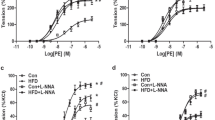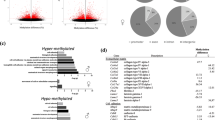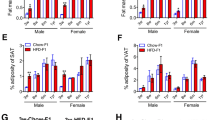Abstract
The angiotensin II signaling system regulates vascular dysfunction and is involved in the programming of hypertension. Maternal exercise has been linked to both short-term and long-term benefits for the mother and fetus. However, the impacts of maternal exercise on the intravascular renin-angiotensin system (RAS) in hypertensive offspring remain unexamined. This study examined whether maternal exercise has an epigenetic effect in repressing angiotensin II type 1 receptor (AT1R) expression, which leads to favorable alterations in the mesenteric artery (MA) function of spontaneously hypertensive offspring. Spontaneously hypertensive rats (SHRs) and Wistar–Kyoto (WKY) pregnant rats were randomly divided into an exercise group and a control group. Blood pressure, vascular tone, AT1R protein and mRNA expression, and AT1R gene (Agtr1a) promoter methylation status were examined in the MAs of 3-month-old male offspring. Maternal exercise significantly reduced the resting blood pressure and cardiovascular reactivity of offspring from SHRs. Furthermore, Ang II–AT1R activity in regulating vascular tone and AT1R expression was decreased in the MAs of the SHR offspring from the exercise groups. Importantly, exercise during gestation suppressed AT1R expression via hypermethylation of the Agtr1a promoter region and upregulated DNA methyltransferase (DNMT) expression in MAs of SHR offspring. These results suggest that maternal exercise upregulates DNMT expression, resulting in hypermethylation and repression of the Agtr1a gene, which may prevent MA dysfunction in the offspring of SHRs.

A mechanistic model on the epigenetics of exercise during pregnancy. Maternal exercise during pregnancy triggers hypermethylation and transcriptional suppression of the Agtr1a gene via increased DNMT1 and DNMT3B expression in MAs of SHR offspring. Downregulation of AT1R expression reduces the contribution of Ang II to vascular tone, ultimately improving vascular structure and function. VSMC vascular smooth muscle cell; Ang II angiotensin II; AT1aR angiotensin type 1 receptor (AT1R) alpha subtypes; Agtr1a AT1R alpha isoform gene; MAs mesenteric arteries; BP blood pressure.
This is a preview of subscription content, access via your institution
Access options
Subscribe to this journal
Receive 12 print issues and online access
$259.00 per year
only $21.58 per issue
Buy this article
- Purchase on Springer Link
- Instant access to full article PDF
Prices may be subject to local taxes which are calculated during checkout







Similar content being viewed by others

References
Heagerty AM, Aalkjaer C, Bund SJ, Korsgaard N, Mulvany MJ. Small artery structure in hypertension. Dual processes of remodeling and growth. Hypertension (Dallas, Tex: 1979) 1993;21:391–7.
Brozovich FV, Nicholson CJ, Degen CV, Gao YZ, Aggarwal M, Morgan KG. Mechanisms of vascular smooth muscle contraction and the basis for pharmacologic treatment of smooth muscle disorders. Pharm Rev. 2016;68:476–532.
Li D, Lv J, Liu F, Liu P, Yang X, Feng Y, et al. Hypertension burden and control in mainland China: Analysis of nationwide data 2003-2012. Int J Cardiol. 2015;184:637–44.
Unger T, Paulis L, Sica DA. Therapeutic perspectives in hypertension: novel means for renin-angiotensin-aldosterone system modulation and emerging device-based approaches. Eur Heart J. 2011;32:2739–47.
Mehta PK, Griendling KK. Angiotensin II cell signaling: physiological and pathological effects in the cardiovascular system. Am J Physiol Cell Physiol. 2007;292:C82–C97.
Nguyen Dinh Cat A, Touyz RM. Cell signaling of angiotensin II on vascular tone: novel mechanisms. Curr Hypertens Rep. 2011;13:122–8.
Dasgupta C, Zhang L. Angiotensin II receptors and drug discovery in cardiovascular disease. Drug Disco Today. 2011;16:22–34.
Higuchi S, Ohtsu H, Suzuki H, Shirai H, Frank GD, Eguchi S. Angiotensin II signal transduction through the AT1 receptor: novel insights into mechanisms and pathophysiology. Clin Sci (Lond). 2007;112:417–28.
Ferrario CM. Importance of the renin-angiotensin-aldosterone system (RAS) in the physiology and pathology of hypertension. An overview. Drugs. 1990;39:1–8.
Chen Y, Li S, Xu Z, Zhang Y, Zhang H, Shi L. Aerobic training-mediated DNA hypermethylation of Agtr1a and Mas1 genes ameliorate mesenteric arterial function in spontaneously hypertensive rats. Mol Biol Rep. 2021;48:8033–44.
Barker DJ. In utero programming of chronic disease. Clin Sci (Lond). 1998;95:115–28.
Kusuyama J, Alves-Wagner AB, Conlin RH, Makarewicz NS, Albertson BG, Prince NB, et al. Placental superoxide dismutase 3 mediates benefits of maternal exercise on offspring health. Cell Metab. 2021;33:939–56.
Barakat R, Pelaez M, Cordero Y, Perales M, Lopez C, Coteron J, et al. Exercise during pregnancy protects against hypertension and macrosomia: randomized clinical trial. Am J Obstet Gynecol. 2016;214:649.e1–.e8.
Mudd LM, Owe KM, Mottola MF, Pivarnik JM. Health benefits of physical activity during pregnancy: an international perspective. Med Sci Sports Exerc. 2013;45:268–77.
Dempsey JC, Butler CL, Sorensen TK, Lee IM, Thompson ML, Miller RS, et al. A case-control study of maternal recreational physical activity and risk of gestational diabetes mellitus. Diabetes Res Clin Pr. 2004;66:203–15.
Arif M, Sadayappan S, Becker RC, Martin LJ, Urbina EM. Epigenetic modification: a regulatory mechanism in essential hypertension. Hypertens Res. 2019;42:1099–113.
Muka T, Nano J, Voortman T, Braun KVE, Ligthart S, Stranges S, et al. The role of global and regional DNA methylation and histone modifications in glycemic traits and type 2 diabetes: A systematic review. Nutr Metab Cardiovasc Dis. 2016;26:553–66.
Muka T, Koromani F, Portilla E, O’Connor A, Bramer WM, Troup J, et al. The role of epigenetic modifications in cardiovascular disease: A systematic review. Int J Cardiol. 2016;212:174–83.
Raftopoulos L, Katsi V, Makris T, Tousoulis D, Stefanadis C, Kallikazaros I. Epigenetics, the missing link in hypertension. Life Sci. 2015;129:22–6.
Li S, Chen Y, Zhang Y, Qiu F, Zeng F, Shi L. Prenatal exercise reprograms the development of hypertension progress and improves vascular health in SHR offspring. Vasc Pharm. 2021;139:106885.
Li S, Chen Y, Zhang Y, Zhang H, Wu Y, He H, et al. Exercise during pregnancy enhances vascular function via epigenetic repression of Ca1.2 channel in offspring of hypertensive rats. Life Sci. 2019;231:116576.
Pei F, Wang X, Yue R, Chen C, Huang J, Huang J, et al. Differential expression and DNA methylation of angiotensin type 1A receptors in vascular tissues during genetic hypertension development. Mol Cell Biochem. 2015;402:1–8.
Rocha R, Peraçoli JC, Volpato GT, Damasceno DC. Campos KEd. Effect of exercise on the maternal outcome in pregnancy of spontaneously hypertensive rats. Acta Cir Bras. 2014;29:553–9.
de Resende e Silva Abate DT, Barbosa Neto O, Rossi e Silva RC, Faleiros ACG, Correa RRM, da Silva VJD, et al. Exercise-training reduced blood pressure and improve placental vascularization in pregnant spontaneously hypertensive rats–pilot study. Fetal Pediatr Pathol. 2012;31:423–31.
Volpato GT, Damasceno DC, Kempinas WG, Rudge MV, Calderon IM. Effect of exercise on the reproductive outcome and fetal development of diabetic rats. Reprod Biomed Online. 2009;19:852–8.
Rose JL, McCarty R. Maternal influences on milk intake in SHR and WKY pups. Physiol Behav. 1994;56:901–6.
Azar S, Kabat V, Bingham C. Environmental factor(s) during suckling exert long-term effects upon blood pressure and body weight in spontaneously hypertensive and normotensive rats. J Hypertens. 1991;9:309–27.
Barker DJ. The fetal and infant origins of adult disease. BMJ. 1990;301:1111.
Lee JY, Azar SH. Wistar-Kyoto and spontaneously hypertensive rat blood pressure after embryo transfer into different wombs and cross-suckling. Exp Biol Med (Maywood, NJ). 2010;235:1375–84.
Chen F, Cao K, Zhang H, Yu H, Liu Y, Xue Q. Maternal high-fat diet increases vascular contractility in adult offspring in a sex-dependent manner. Hypertens Res. 2021;44:36–46.
Zhang L, Zhang Y, Wu Y, Yu J, Zhang Y, Zeng F, et al. Role of the balance of Akt and MAPK pathways in the exercise-regulated phenotype switching in spontaneously hypertensive rats. Int J Mol Sci. 2019;20:5690.
Nishiyama A, Kobori H. Independent regulation of renin-angiotensin-aldosterone system in the kidney. Clin Exp Nephrol. 2018;22:1231–9.
Eguchi S, Kawai T, Scalia R, Rizzo V. Understanding Angiotensin II Type 1 receptor signaling in vascular pathophysiology. Hypertension (Dallas, Tex: 1979). 2018;71:804–10.
Xiao D, Xu Z, Huang X, Longo LD, Yang S, Zhang L. Prenatal gender-related nicotine exposure increases blood pressure response to angiotensin II in adult offspring. Hypertension (Dallas, Tex: 1979). 2008;51:1239–47.
Schiffrin EL, Touyz RM. From bedside to bench to bedside: role of renin-angiotensin-aldosterone system in remodeling of resistance arteries in hypertension. Am J Physiol Heart Circ Physiol. 2004;287:H435–46.
Szczepanska-Sadowska E, Czarzasta K, Cudnoch-Jedrzejewska A. Dysregulation of the renin-angiotensin system and the vasopressinergic system interactions in cardiovascular disorders. Curr Hypertens Rep. 2018;20:19.
Wang J, Yin N, Deng Y, Wei Y, Huang Y, Pu X, et al. Ascorbic acid protects against hypertension through downregulation of ACE1 gene expression mediated by histone deacetylation in prenatal inflammation-induced offspring. Sci Rep. 2016;6:39469.
Bogdarina I, Welham S, King PJ, Burns SP, Clark AJL. Epigenetic modification of the renin-angiotensin system in the fetal programming of hypertension. Circulation Res. 2007;100:520–6.
Lau C, Rogers JM. Embryonic and fetal programming of physiological disorders in adulthood. Birth Defects Res C Embryo Today. 2004;72:300–12.
Goyal R, Goyal D, Leitzke A, Gheorghe CP, Longo LD. Brain renin-angiotensin system: fetal epigenetic programming by maternal protein restriction during pregnancy. Reprod Sci (Thousand Oaks, Calif). 2010;17:227–38.
Gabory A, Ferry L, Fajardy I, Jouneau L, Gothié J-D, Vigé A, et al. Maternal diets trigger sex-specific divergent trajectories of gene expression and epigenetic systems in mouse placenta. PLoS One. 2012;7:e47986.
Badon SE, Miller RS, Qiu C, Sorensen TK, Williams MA, Enquobahrie DA. Maternal healthy lifestyle during early pregnancy and offspring birthweight: differences by offspring sex. J Matern Fetal Neona. 2018;31:1111–7.
Funding
This work was supported by the National Natural Science Foundation of China [grant numbers 32071174, 31771312 and 32200941], and the National Key R&D Program of China [2022YFC3600201].
Author information
Authors and Affiliations
Corresponding author
Ethics declarations
Conflict of interest
The authors declare no competing interests.
Additional information
Publisher’s note Springer Nature remains neutral with regard to jurisdictional claims in published maps and institutional affiliations.
Supplementary Information
Rights and permissions
Springer Nature or its licensor (e.g. a society or other partner) holds exclusive rights to this article under a publishing agreement with the author(s) or other rightsholder(s); author self-archiving of the accepted manuscript version of this article is solely governed by the terms of such publishing agreement and applicable law.
About this article
Cite this article
Shan, M., Li, S., Zhang, Y. et al. Maternal exercise upregulates the DNA methylation of Agtr1a to enhance vascular function in offspring of hypertensive rats. Hypertens Res 46, 654–666 (2023). https://doi.org/10.1038/s41440-022-01124-7
Received:
Revised:
Accepted:
Published:
Issue Date:
DOI: https://doi.org/10.1038/s41440-022-01124-7


